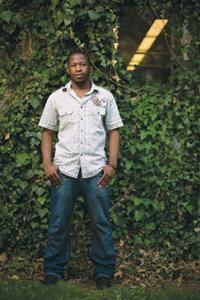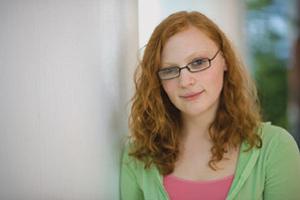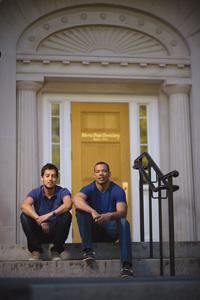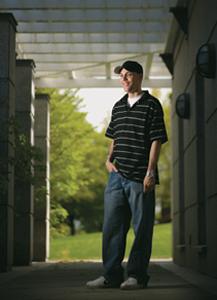By Roger M. Williams ’56
Edward Muguza ’11
Harare, Zimbabwe
 |
Even for “the best student in the Harare area,” which Muguza shyly admits he was, the leap to Amherst was extraordinary. He is the youngest of six children, and neither of his parents has a paying job (father is retired, mother a homemaker), so “money to attend university, even in our own country, was a huge factor.”
After catching the eye of the United States Student Achievers Program (which started in Zimbabwe to help bright, low-income youth apply to college), Muguza began investigating American colleges. A U.S. Embassy education center provided Internet access, but he also did research the old-fashioned way. “I looked them up in a book, and there was Amherst, on the first page. A friend was already there, and he liked it.” Amherst paid for his first trip from Harare to campus.
The college opened so many worlds for this chemistry major that he declares emphatically, “I benefited most from the student diversity and from the relationships I had with professors. They’re definitely the best ones I’ve ever had. Amherst professors have a passion for teaching. And you can meet them outside of class and learn from them in many different ways.” He especially enjoyed lively seminar discussions—something he hadn’t experienced back home. “I didn’t talk much, but when I did, my classmates listened. I had to work to articulate my thoughts. The professors helped me do that, made me feel comfortable.”
Muguza’s new horizons expanded beyond Amherst. He spent his junior year visiting other countries to study their health care systems and problems. Now he has his eye on a career in international health care administration.
Devon Geary ’13E
Fredericksburg, Va.
 |
No one could have followed a more difficult path to Amherst than Geary. Concisely, it unfolded like this: didn’t finish high school; got sick at 15 and wound up in a wheelchair; regressed to six months spent completely bed-bound; graduated to a walker; started community college without yet having a GED. Flash forward to May 2011, outside Keefe Campus Center, when a cheery, almost sparkling Geary finished the year with all A’s except for one A-minus.
She still has some physical problems associated with her disorders: Ehlers-Danlos syndrome (joint dislocation) and postural orthostatic tachycardia syndrome (dizziness, fatigue, high heart rate, “brain fog”). She suffers, for example, in very warm weather and even mildly overheated dorm rooms. And her A’s notwithstanding, her early exposure to Amherst academics left her dazed. “My first weekend, I had to read hundreds of pages; write a paper, an argument paper and a journal entry; watch a film; and do homework for some other class. I think I read a novel, too.”
Yet Geary leads a full, wide-ranging life on campus. An English major, she has also taken music courses, including “Pioneer Valley Soundscapes,” which requires that each student produce a documentary film. She also takes private voice lessons, does salsa dancing and has met a wide group of fellow students in class: “athletes, travelers, and, of course, transfers.” She steers clear only of “the crazy partiers.”
Geary has gotten to know the academic work of her peers in a nonfiction writing class, where, she says with
obvious delight, “We’ve all exposed ourselves by writing personal essays. Once you’ve done that, there’s no shame left!” Now she’s in Brisbane, Australia, for a semester, studying Aboriginal music, literature, grammar and drama.
Emil Vasilev ’11
Sofia, Bulgaria
 Vasilev (left) and Cameron
|
Vasilev applied to an eye-popping 24 American colleges before choosing Amherst, substantially on the basis of receiving a very generous scholarship. His Bulgarian/Kazakh parents divorced when he was young, and he was raised by his mother, a professor of Arabic literature. “My high school—‘the best in Bulgaria’—was so easy it was a joke,” he says. “I was able to skip class for weeks to prepare for the SATs”—a test he took three times to improve his status with admissions officers. An economics major, he was not overwhelmed by Amherst’s academic demands. “I did, however, put in a lot of time in the library.” As a first-year, he also found the Writing Center a helpful resource.
Low-key and thoughtful, Vasilev made plenty of friends beyond his fellow internationals. He found extracurricular activities to be a better vehicle for that than classes. “Being generally social helps the most,” he says. For the immediate future, his concern is investment banking, with Barclays in New York City.
Isaac Cameron ’11
Seattle
Cameron contemplated attending the University of Washington and playing on their football team. Instead, he came to Amherst as a community college transfer and Pell Grantee, ready to sacrifice Division I sports for academics and the pleasures of small-campus life. His economic situation, he says, meant that his family didn’t have to pay anything toward his tuition and fees. He didn’t think back then that this would put him at a disadvantage at Amherst, and he still doesn’t: “Some of the strongest students here are from backgrounds like mine.”
He feels that Amherst has cultivated one of the most distinctive atmospheres in the country. “And that’s the reason I loved this place so much,” he says. “It’s a unique space that brings together people who are products of very different circumstances.” The diverse student body “reflects issues in the real world, and it’s what you get naturally by mixing Pell Grant people like me with the kids of some of the top-name families in the country.” Still, in “attempting to reformulate deeply ingrained cultural and social patterns,” he says, “there is bound to be tension. Given the difficulty of the task, I think Amherst should be proud of what it has so far accomplished.”
An economics and black studies major, Cameron landed a very prestigious appointment at Amherst: a place on the Presidential Search Committee.
Amherst’s tough academic load, Cameron points out, is not so tough when compared to the school-plus-work burden that most community college students carry. At Amherst, he says, “you can just concentrate on studies, and you can completely delve into intellectual endeavors.” That does not, he adds with a grin, preclude some light moments. “Early on, my English professor took me aside and asked, ‘Has anybody every talked to you about passive verbs?’ [as in, overusing them]. ‘Hell, no,’ I said. ‘Come to my office,’ he said.”
As he left after graduation to pursue a consulting job, Cameron reflected, “I really tried to push myself academically. I have fulfilled a lot of the goals I came here with.”
Danielle Santiago Ramos ’13
Jaboatão dos Guararapes, Brazil
 |
To this young woman, education and paying work are entwined. At Amherst, she has held three jobs—simultaneously. Not only does she need to earn spending money, she also wants to help her family pay for her plane tickets.
Santiago Ramos has a fierce loyalty and sense of obligation to her parents. “It was really, really hard for me to leave Brazil to come here,” she says. “Life has been difficult for them. My father did not finish high school, and my mother just recently earned an undergraduate degree and doesn’t make much.” That sense of obligation—to the Koenig Scholarship program as well as to her parents—has shaped her Amherst experience. “I’ve given up many things here in order to concentrate on studies. I don’t go to parties or do extracurricular activities. I feel I should get the best grades possible, because somebody is paying for my education.”
Santiago Ramos’ entrée to Amherst came by way of a Fulbright program called Opportunity Grants. “They help you apply, and they give you a mentor.” As a first-year, she was “scared to death” of the writing assignments, but she forced herself to make steady improvement, because “I want to write a thesis, and write it well.” Her extraordinarily busy schedule and concentrated effort have come at some social cost. She says that she sticks closely to international and transfer companions.
A geology and mathematics major, she won a Koenig recruitment stipend in the summer of 2010 to give presentations about Amherst to schools near her hometown in Brazil. And she brightens when describing her plans for this summer: a geology department grant—“including airfare”—to do field work in the American West.
Gregory Campeau ’11
 |
Tehachapi, Calif.
When Campeau’s classmates voted him student speaker for the 2011 Commencement, the honor capped a striking upward trajectory that began several years ago. The product of what he terms a “no-college” family and a “pretty bad” high school, he enrolled in its best offering, an International Baccalaureate program, and proceeded to graduate with a GPA of 4.6 (on a scale of 4.0). At Amherst, his senior-year performance brought his four-year GPA to 3.61. For his history department thesis, he received a recommendation for magna cum laude as well as the religion department’s Moseley Prize. Campeau speaks of those achievements with a quiet satisfaction that seems almost analytical.
His background influenced his reaction to and assessment of Amherst social life. “Compared to the norm, people like me are from an entirely different world,” he says. “My father is a security guard. Most of my friends were like me: scholarship kids who didn’t grow up in the Northeast.” The “seriousness,” “maturity” and “motivation” of Amherst’s transfer students particularly impressed Campeau, who is now a pastoral intern at a church called MERCYhouse in the Town of Amherst. He plans to apply to theological seminaries.
Colleen O’Connor ’11
Westhampton, Mass.
 |
“People like me didn’t go to college,” says O’Connor of her disinterest in higher education while in high school. Her father is an auto mechanic and her mother a cook (who will soon start nursing classes). Yet O’Connor made her way to Holyoke Community College. Managing five hours of classes per day in addition to working 24 hours a week, she earned a 4.0 GPA and a recommendation to look to Amherst for a four-year degree. To test the waters, she took a noncredit class at Mount Holyoke through a joint program with the community college.
She found Amherst “very rigorous, and at first I didn’t handle it well. I wasn’t good at organizing my time.” She envied students from private-school backgrounds, feeling that they came in with an academic advantage. Nonetheless, she jumped boldly into an Ancient Greek course heavy on translation, before she even knew the Greek alphabet, and knocked down an A-minus. Majoring in English, she overcame her organizational problems and took classes in ecology and computer science.
“I’m not insanely social, so living in a dorm was kind of tough,” O’Connor says. She found a few fellow students insensitive to her background. (When she thoughtfully cleared the table for her fellow diners, one said, “Oh, yes, you’re our career waitress.”) But she didn’t feel “pigeonholed,” and she thinks “the college has good support services and programs for integrating transfers—I did make non-transfer friends. At least at first, it’s natural to center your life on other transfers: they’re the people you meet when you arrive. But I did develop friends in other ‘groups.’”
In sum, she says, “I never felt I was in a situation I couldn’t work through.”
She aims to get an M.F.A. in creative writing, with an eye toward work in advertising, museums or archives. Meanwhile, she is a research assistant for Professor Frank Couvares, helping to develop a joint class between Amherst and Holyoke Community College on immigration in Holyoke.
Ruben Sepulveda ’13
Brooklyn, N. Y.
 |
Only a diversity dreamer could imagine a less likely Amherst student than this man: 36 years of age, with a daughter; homeless for years; a former pool hustler who slept in subways and, for long stretches, “on the floor of the pool-hall boiler room.” In short, a late-model New York wiseguy, with seemingly no place to go but down. Even in the deepest of those depths, says Sepulveda, “I knew I had a brain. And I knew that if I could apply the same energy to learning that I used to excel at pool, I had a chance to be something.”
His chance took root after he went to live with family members in Holyoke. Unemployed and with a G.E.D., he took up writing—“my version of the events of my life”—and providentially encountered a woman who ran an adult learning center. Conversations about “economics, politics, education” followed; so did a a tutoring position with the center, then enrollment in Holyoke Community College. “Everybody I talked to about Amherst was passionate about it,” he recalls. “I thought, ‘I want to go to a school I can be passionate about.’” Working each night from 11 p.m. to 7 a.m. and then going each morning straight to “the most rigorous classes” he could find at community college, he managed to enter Amherst as a second-semester sophomore.
His Amherst courses? “Hard, man, hard. Take statistics class—brutality at its best! I dropped it. I felt bad, but I knew nothing about algebra. I’ll take it later, though, and pass it.” (In fact, he’s studying for the class this summer.) He professes little interest in the normal markers of progress: “I’m not concerned about my GPA. The question for me is, Did I get it?” He’s especially enjoyed “Personality Psychology” and a course in film and writing. As for other students, “I thought they would look at [or] listen to me and think, ‘My God, who’s this guy?’ But nobody’s really like that. They listen to my story.”
Maggie Huang ’13
San Francisco
 |
The daughter of Chinese immigrants, Huang went to what she describes as a “very rigorous” high school. She had positive impressions of Wellesley as well as Amherst. Family finances weighed heavily in her choice: Wellesley’s financial aid didn’t match Amherst’s.
Huang’s high school rigors have served her well. She has a cumulative letter grade of A-minus, she says, and has gotten A’s in such departments as Women’s and Gender Studies, Asian Languages and Civilizations (in which she expects to major), Chinese and Italian.
Huang is particularly concerned about diversity on campus. She wishes it were easier to have conversations about its social aspects. She feels that Amherst should take additional steps to “critically engage diversity issues” after the admission process, and while admitting that she could also do more to reach out to other students, she says it’s often more comfortable not to do so. “Although everybody has been friendly and nice, some lack awareness of people who aren’t like themselves. At times I’ve felt invisible.”
This summer, with funding from Amherst’s Center for Community Engagement, she interned in India with a nongovernmental organization that works on rural development. The internship fits right into her expected career: “nonprofit management, maybe abroad, or education administration.”
Matt Brewster ’11
Rochester, N.Y.
 |
If some transfers at Amherst tend to cluster together socially, Brewster is the anti-cluster icon. Declining to observe distinctions among student groups, he socialized with individuals in all of them. “It’s difficult for me to tell the difference” between transfer students and others, he says. He’s a natural schmoozer.
People who don’t know him well “think I’m from a wealthy background,” Brewster says. “I was shocked at how well I fit in.” His father did not finish secondary school and has been unemployed for long periods; his mother died years ago. Family support was so skimpy that by the time he reached senior year in high school, Brewster was living on his own—and working 40 hours a week. “Nobody was pushing me to get an education, and I had no concept of it.” When the idea struck him, however, “I became obsessed with getting into a top school.”
It’s hard to get into Amherst no matter what, but few high-school seniors have to support themselves financially at the same time—after losing their mother. In that respect, Brewster feels that many students have led “sheltered lives” in comparison. He also feels that some Amherst students stigmatize the transfers. “We knew we had a stigma; it was just a question of how much of one and how to process it. A lot of us didn’t know how.”
Amherst accepted only two-thirds of his community college credits, “but that was okay by me,” says the economics and political science major. “I was plenty motivated to study hard here.” Next up: an investment consulting job, to help him save up money for law school. “Got to do that,” he notes. “Law schools are not as generous as this place.”